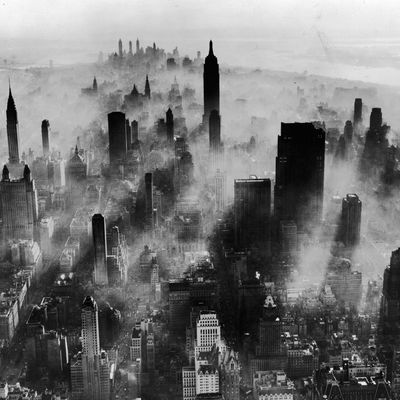
The next time you’re out for your daily mental health walk, look around — commemoration abounds. A bench in Central Park, a mural outside a bodega, a bridge in Queens, a tree on Eastern Parkway, the prayer book at a church, a sandwich at a deli — all of these things have been named in honor of someone. If you’re a somewhat decent person who made even a small contribution, in New York City you stand a better-than-average chance that something will bear witness to your former existence.
And yet it seems that anybody who could has fled the city already, which means the end of the qualities that only weeks ago made living here such an exciting adventure: density, proximity, intensity, access. Their abandonment leaves those of us left behind with a brutal new kind of FOMO. Trapped in our apartments, cut off from everything, endlessly scrolling through feeds full of pictures of family redoubts and rural strongholds, we worry that we’re missing out on staying alive. The city itself seems out to get us. Everything promised by New York now stands to endanger us. The polarity has reversed.
If you’re not from New York City, the urge to run back home can be overwhelming. I talked to my friend on a recent Friday afternoon. He said he felt anxious in the city and was thinking about renting a car to get out of town with his wife and year-old son. I understood his impulse to flee, especially with a baby. When I got a text from him the following Sunday, he was already a thousand miles across the continent, halfway to his hometown in Canada. A so-called city of immigrants is a city full of homesick people, and when a crisis hits, that homesickness evolves from a sweet nostalgia for a life left behind into a desperate desire to live that life again.
In these moments, I remind myself why I am here. I came to New York because I married a New Yorker. My wife was born and raised in the West Village. So much of her is so much of here that I often feel like New York is part of my family. The city is my second mother-in-law: critical, impatient, always asking what I’m doing next. And like my real mother-in-law (a New Yorker to her bones, rich in the city’s lore), I want to make her proud.
I used to worry about being a “real” New Yorker, when the scale of the city overpowered me and I felt lost amid its monuments. I don’t worry about that anymore. Living here through this crisis has shown me that the true scale of the city is intimately human. It’s cooking smells in the hallway, music passing by the window, voices seeping through the walls. It’s smiles and thumbs up walking down the street. It’s a symphony of grateful applause every night at 7 p.m. When most people consider their demise — however distant, however remote — they depend on the consolation that someone will notice that they’re gone, that they will be mourned.
I don’t fear dying here, but I do fear the death of the city I love.




